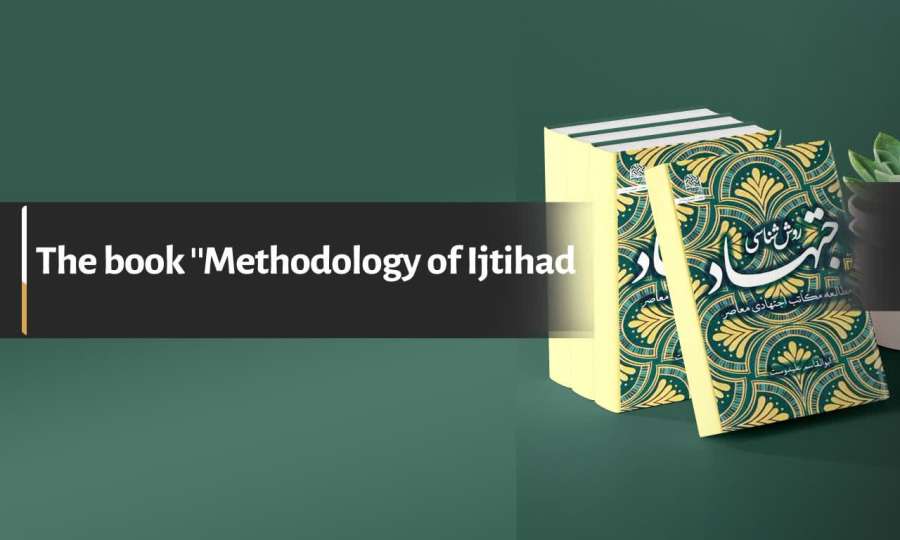The book “Methodology of Ijtihad” by Ayatullah Abulqasim Alidust, a member of the board of trustees of the Institute of Contemporary Fiqh Studies, was recently published by the Institute of Islamic Culture and Thought.
According to the Contemporary Jurisprudence Research Institute, citing Ijtihad Network, one of the fields of study of prof. Abulqasim Alidust is the field of philosophy of jurisprudence, which includes works such as “Jurisprudence and Reason”, “Jurisprudence and Custom”, “Jurisprudence and Expediency” and a large number of related scientific research articles. The works that have deservedly received the attention of the scientific community and have been ranked top in many national festivals such as the Year Book of the Islamic Republic and the Year Book of the Field.
In addition to the value of such discussions, philosophical studies become more efficient when some of their works can be shown in the methods used in inference. The present work is the result of the scientific effort of Prof. Abulqasim Alidust, who deals with the methodology of ijtihad.
Prof. Alidust here presents the important topic of “methodology of ijtihad” in two parts: methodology in the first part deals with the current study of contemporary schools of ijtihad and in the second part with the theory of confidence.
The purpose of the first part is to study the comparison and evaluation of contemporary ijtihad schools, which this book is responsible for. This research deals with 20 methods of ijtihad, all of which have a serious presence in jurisprudence in the contemporary era, and identifies and evaluates them with a qualitative and pathological perspective. Also, the meaning of the second part is to express the desired and acceptable method according to the author’s belief; A method that you can trust and be sure of its outcome.
Prof. Alidust said about his new work: In the book “Methodology of Ijtihad”, I observed and compared contemporary schools of ijtihad, and I researched and named 20 jurisprudential schools and methods according to their reality, and then I compared them with each other. Jurisprudence methods that have supporters and examples, for instance, jurisprudence that is conditional on the texts that show the intentions; Or a jurisprudence which considers the destination as sufficient, and a jurisprudence which considers the purposes but does not place the axis. Or a jurisprudence that is more in search of the name of Shari’ah titles, in contrast to a jurisprudence that is objective. Thus, I did not mention here the Akhbari jurisprudence, Usuli jurisprudence, Ahl al-Qiyas jurisprudence, etc., because these are not the contemporary schools of ijtihad.
This member of the Qum seminary community of teachers then added: In this work, the methods have been tried to be precise and accurate, that is, an abstract and hypothetical discussion has been strictly avoided.
The prof. of jurisprudence and principles of Qom seminary also announced the publication of another volume of the work that deals with the “theory of certainty” and stated: This work is not an ontological discussion but rather the theorists’ and the requirements that must be considered in a good ijtihad are explained. And it is against injuries. This volume will probably be released on the book market this summer.
At the end, Prof. Alidust said, referring to the approval of the book by the Supreme Leader: Ayatullah Khamene’i visited the book exhibition in Tehran at the publishing house of the Research Institute of Islamic Culture and Thought. They presented the book “Methodology of Ijtihad” to them, who after reading and studying the subject of the book liked it and expressed their satisfaction with the content of the work.
Those interested in preparing the first edition of the book “Methodology of Ijtihad; The Study of Contemporary Ijtihad Schools” written by Prof. Abulqasim Alidust, for the price of 324,000 Tumans, refer to the website of the Islamic Culture and Thought Research Institute.
Structure of the book:
First part: Concepts and basics
Concepts: Shari’ah, ruling, jurisprudence, ijtihad and inference, methodology of ijtihad;
Basics of generalities: historiography of determining ijtihad and jurisprudence, origin of jurists’ differences and emergence of methods and schools of jurisprudence, ijtihad in ijtihad in the conflict of necessity and prejudice, opening and blocking of ijtihad, ijtihad and error and approval.
Second part: contemporary schools of ijtihad
A: The school of jurisprudence of contentment (with the combination of suspicion) and the school of jurisprudence of industry
B: Nass Basand, Basand and Nass-oriented jurisprudence schools with supervision of the objectives.
D: Jurisprudence of the maximum stop on the words of texts (nominalism) and identitarianism.
E: jurisprudence sufficient to the text and application of the law and jurisprudence of justice and ethics.
And: jurisprudential methods of conflicting evidence management.
Z: Jurisprudence parallel to the tradition of Ahl al-Sunni in the struggle between necessity and denial.

